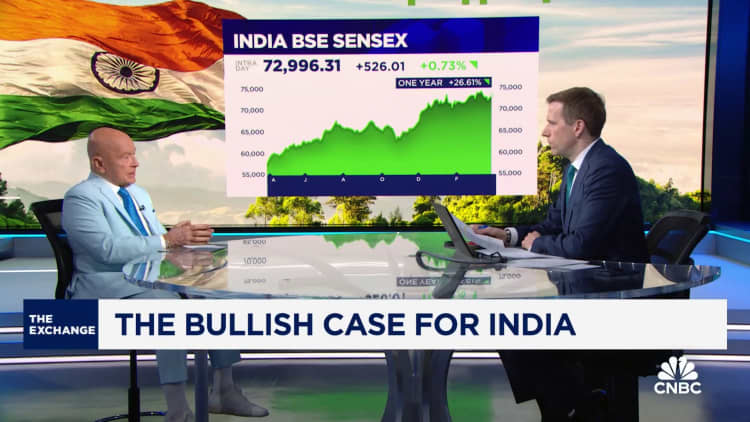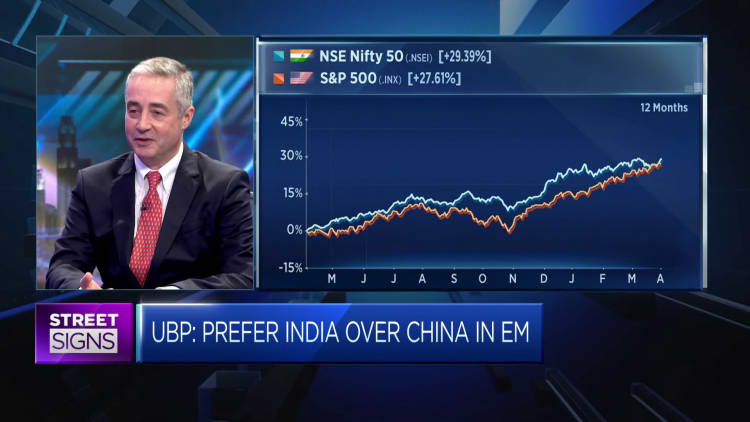India's market capitalization can easily grow to $40 trillion in the next 20 years, driven by stronger investor confidence and robust economic growth, analysts said.
"We can easily hit $40 trillion by that time," said Sujan Hajra, chief economist at Anand Rathi Share and Stock Brokers, citing the country's strong economic growth and "far more stable" currency.
Manish Chokhani, director of investment services firm Enam Holdings, is even more bullish and predicted Indian markets could surge to $60 trillion in the next two decades.
India's benchmark Nifty 50 index soared 20% in 2023. After overtaking Hong Kong in December, the country's market is now ranked the fourth largest in the world, valued at over $4.6 trillion. On Monday, the Nifty 50 and BSE Sensex surged to fresh closing highs of 22,666 and 74,742, respectively, Refinitiv data showed.
"India's GDP growth has led to companies increasing their earnings and that is resulting in the stock market performance," said Atul Singh, CEO and managing director of wealth management firm LGT Wealth India.
India's Ministry of Statistics said the country's economy grew 7.2% for financial year 2023 and is estimated to grow 7.6% in financial year 2024. The country's financial year starts on April 1 and ends on March 31.

In contrast, Singh noted that China's economic growth has not led to stock market appreciation in recent years. Last year, China's economy grew 5.2%, matching the official target of around 5%. However, the benchmark CSI 300 has declined three years in a row, shedding 11.4% last year.
"So the growth in India's stock market is driven by real earnings growth … That process of nominal GDP growth converting into earnings growth and stock market returns will remain intact even in the next 20 years," Singh told CNBC in an interview.
India also has a "pipeline of new capital" that can continue to boost market valuations, Hajra said. India saw 220 initial public offerings in 2023, the highest of any country according to EY.
"India has the largest number of listed companies in the world globally at over 6,000 and they like raising equity earlier in their life cycle," explained Hajra.
'Opportunities are everywhere'
India's markets have become more expensive after the recent rallies. The benchmark BSE Sensex has a price-to-earnings ratio of 25.44, compared to the Shanghai Stock Exchange and Shenzhen Stock Exchange's average P/E ratio of 12.25 and 21.12, respectively.
Despite those high valuation multiples, analysts said India should still be part of an investor's core allocation.
Goldman Sachs' Asia-Pacific portfolio strategist Sunil Koul advised investors to pay more attention to large cap stocks as he predicts there will be a shift away from small and mid-cap stocks.
"One of the key views we have coming into the year is that you should see a rotation in the markets. It was the year of mid and small-caps, and that seems to be changing already over the past one month," Koul told CNBC's "Street Signs Asia" last week.

LGT Wealth India's Singh, however, said "opportunities are everywhere."
He recommended paying attention to the financial services sector as "there are great companies that have a lot of secular growth," he noted.


